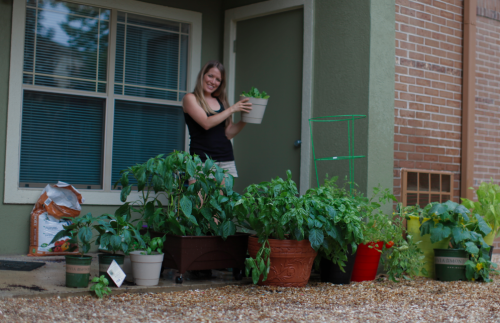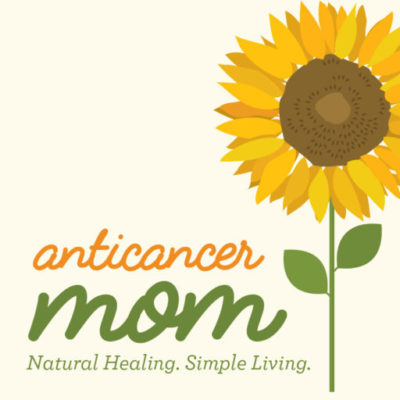If I can do it, there is definitely potential for anyone starting your own container garden!

You see, when I originally wrote this post I lived in a 1,000 square foot apartment in Atlanta. You wouldn’t think I would have much potential for gardening, but one look at this picture and you can see my mini-vegetable jungle in full bloom!
Several years ago I began my gardening adventures with a single plant. A tomato plant. At least that’s what I thought until it began to grow cucumbers. True story.
For the first THREE weeks I thought maybe tomatoes were elongated and green in their infancy. Nope, only if they are cucumbers! 😂
Starting Your Own Container Garden:
Basics:
I bought a few books on the topic of container garden after my tomato/ cucumber mishap. There is really only one I recommend you buy if you are getting started, and that is McGee & Stuckey’s Bountiful Container.
I found that this has all the information ANY container gardener would need to know! Here’s what I learned from both the book and from my experience with successful container gardening.
1. You Need Drainage
It may sound elementary to some of you, but to start your own container garden the first thing you will need is a pot with holes in the bottom for water drainage. No drainage= PROBLEMS! When deciding on size, you need to know the adult size of the plant you want to grow. Of course, aesthetically, you may want to coordinate your pots. This year. I went thrifty and turned anything I could into a container. (Sorry neighbors!) I even had stools and garbage cans from IKEA that I drilled holes in the bottom of to make cheap pots!
2. Healthy Soil
The right DIRT is very important in container gardening. Make sure to buy an organic POTTING MIX. I learned this the hard way. Buying garden “soil” or even potting “soil” will lead to a stunted and rotted container garden. The “soil” will compact and it makes it difficult for water to drain through and roots to grow in a container. Buy Potting MIX.
3. Time Your Planting
Check your area’s planting schedule for when and what you will be able to plant HERE. You will need to enter your zip code into the box and then click on your Zone number.
4. Start With Transplants
If you’re a newbie gardener, I would start with “transplants.” These are baby plants that you buy at your local gardening store or nursery. Simply remove them from their temporary container, and “transplant” them into the containers they will grow to maturity in. This year my tomato plants were transplants and the first of my garden babies to produce (no, not a cucumber) a true TOMATO! Needless to say, I felt super awesome this time around. (:
5. Jiffy Pellets- What??
If starting plants from seeds, know that many seeds actually need to be started inside in smaller containers or even a Jiffy pellet kit. I learned this from the lady at my local Pike Nursery, but there are TONS of videos about this on You Tube as well. Jiffy pellets are what I used to start growing my pepper plants and all but one of the 12 I started with have survived and are beginning to flower and sprout REAL peppers! (And it’s super easy!)
6. Buy Organic Seeds
If you can find ORGANIC seeds in your area, I would use these for your garden. This way you can guarantee no pesticides are lingering, especially if you plan on using organic farming methods to maintain your garden. Also, you never know what is a GMO these days!
7. Feed Your Plants
You will need to feed your plants often with a good organic plant food or fertilizer if you want an abundant crop. I like E.B Stone for under $10.00 which should last you the whole season.
8. Water Water Water
Water daily. Filtered water is great, but don’t beat yourself up if you don’t. Rain water isn’t filtered either. We have THIS FILTER for our garden hose.
9. Make your Own Organic Pest Spray
If you NEED to use pesticides, look up some organic, natural pest control methods online or read about them in the book I recommended. These can be as simple as some peppermint oil and cayenne pepper diluted with water and castile soap in a spray bottle. Container gardens are much less likely to have pests since they are not in-ground. It also helps to keep them on a cement slab or patio to avoid pests even further. I feel “slack” for not telling you guys what miracle organic pesticide has worked for me, but I haven’t had a bug problem yet!
10. Enjoy and Cherish
Take time to sit in and enjoy your garden! My daughter and I are so proud of ours and it has become a ritual for us everyday to water our garden together and say “hello” to the plants. No matter how totally hippie that sounds, we love it! This year we have successfully grown tomatoes, banana peppers, bell peppers, basil, lavender, parsley, carrots, radishes, beans, chard, and cucumbers.
If you got to the end of this list and still feel overwhelmed, please know that I felt the same way in the beginning. My green thumb surely evolved over time and from trial and error. Start with your one plant. Just one! And perhaps your love of container gardening will grow. 🙂
I’m curious what you guys would add? How many experienced container gardeners out there?

Want to be notified when new posts are published?
SUBSCRIBE to my newsletter and as a bonus you will receive my 60+ page Anti-Cancer Lifestyle Guide with 5-Day Meal Plan and over 25 recipes + printables. 😊
Follow me on Facebook and Twitter.

Had success with tomatoes and peppers and then along came fruit flies and my plants started dying. I used apple cider vinegar and red wine but to no avail. My basil, mint and lavender plants are being destroyed now. Don’t want to buy commercial pesticides. Anyone with a similar problem please let me know how to solve it.
I have started flowers and tomatoes in pots inside till the last frost. I wonder if thinning is important in containers. Also we have no sun except in front on public sidewalk and on upstairs balcony. Outside they will go soon! From the Ohio River valley in Kentucky! Thanks for reposting this!
Hi Mary! I thin my container tomato and cucumber plants! Not sure if that helps right now though. 😉 You’re welcome!
Such great tips! I already did my container planting and wish I had read this ahead of time…oh well! I’ll just hope for the best. 🙂
I’m sure you did a great job!! In your late summer planting, you can follow some of these tips. (:
If you can’t capture rain water or filter your garden water you should keep some water in holding containers to allow the chlorine and other chemicals to “flash” off (evaporate) for at least 24 hrs. It’s simply a matter of knowing how much water you use and it will make you a better gardener by making you aware.
While I have ample room for my gardening addiction, I will be shifting much of next years crop to “self watering” containers, which I have experimented with this year. They are simple to make and provide a consistent supply of water to the plants as they utilize it. I am working on plans for a self watering raised bed since I do have room and am a proud geek in my garden.
A couple of good sources of information for the newbie organic gardener can be found on Face Book. The second deals extensively with container gardening.
https://www.facebook.com/pages/Occupy-Gardening/351746341503313
https://www.facebook.com/willemvancotthem
This is AWESOME (: Thanks for the great recommendations!
I found mine at Target believe it or not! I’m not sure of websites, but I’m sure you could browse around and be able to recommend one to me!
Hi,
Where do you get organic seeds ?
Can you recommend some good websites ?
Thanks
Excellent post!
Just curious, how many hours
of direct sunlight does your spot get
per day?
Hey Chris!
Just got your email about your call in show tonight (and tomorrow night!) VERY cool. I’ll be listening. (:
I have an awesomely sunny apartment. I would say that area gets 8-10 hours of direct sunlight. Because of the overhang, I pull most of my cooler weather/ shade plants back into the porch and leave my tomatoes, peppers, cucumbers, and beans out all day.
He he, your tomatoes were cucumbers! We grow tons of veggies in pots as well, and it’s such an easy way to get started gardening… Although I have to confess that my mother does all the hard work and I just eat it all – my faves have been arugula for salads and fresh mint.
P.S. Thanks for your inspiring Q+A, which II posted today – learned so much about and from you!
Eating them and knowing you grew them (and what touched them) is the BEST! Thanks for your kind words. (: